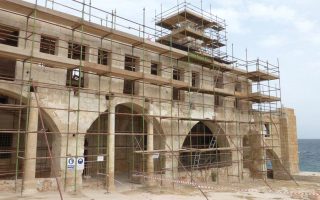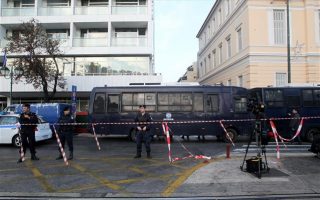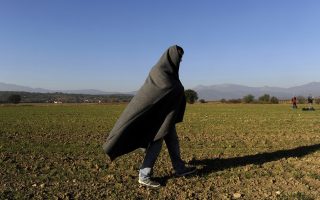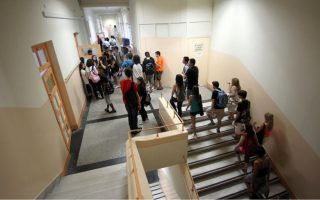Unlicensed mosques in spotlight after Paris attacks
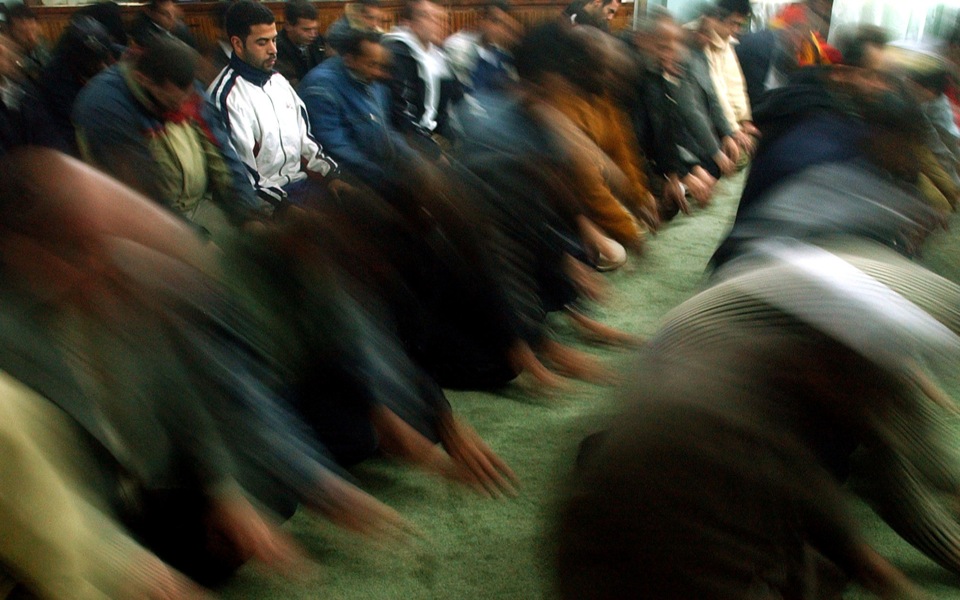
The Hamza Mosque, which started operating in an apartment in central Athens this summer, is mainly used by Athens’s Bangladeshi community. It has a green door with a sign giving its name and license number. The mosque is run by Helal Helal, a Bangladeshi who has lived in Greece for the past 20 years. He understands that “with legitimacy come rights but also responsibilities.”
Kathimerini has learned that there are two more Muslim houses of prayer that are operating legitimately after an initiative by the Greek state to address the absence of a mosque in the capital, which is in violation of European Union regulations governing the right to worship. The issuing of licenses started in 2014 and so far three mosques have been successful: Hamza, another in Piraeus used by Greek Muslims, and a third in western Athens, which is used mainly by the Pakistani community.
The licenses are issued to the mosques’ caretakers, prominent members of their respective communities and longtime residents of Greece. These men are not proper imams as they have not been formally trained, but they manage the space and also act as the state’s “eyes and ears” in the Muslim community. A few months ago, for example, they wrote to the Greek authorities informing them of the “odd” behavior of a “preacher” at an unlicensed mosque who was inciting Sunnis to “holy war” against the “apostates” of Islam. The man was arrested and deported.
Like most unregistered spaces in Greece, mosques are created by communities looking for a place to gather and worship, and then, often after many years of unlicensed operation, apply for a permit. There is little alternative, given that plans for a mosque in the Greek capital have remained on ice for years amid reactions from community and religious groups. The city’s Muslims, who are estimated to number between 130,000 and 200,000, and even the relevant authorities do not believe that the community will get a proper mosque anytime soon, despite pledges.
The issue of unlicensed mosques operating in makeshift spaces, often in obscure apartments in parts of the city with a strong migrant presence, has shot to the fore following the terrorist attacks in Paris by jihadist militants and calls for greater scrutiny of mosques where imams are known to embrace extremist dogmas or rhetoric. With unlicensed facilities, no one but worshippers can know who is attending and what is being preached. Greek authorities in the past have identified two men – an Afghan and a Syrian – who were suspected of spreading extremist views in the aftermath of the 2004 Athens Olympics, when the country acquired more sophisticated counterterrorism and surveillance capabilities.
The majority of Athens’s mosques want to operate legitimately. They have strong community ties, run educational programs and have formed committees that are working toward meeting the criteria for recognition.
The state has said that it wants to legalize all the spaces used for prayer that fulfill the criteria required by law, which also include all the different permits needed for spaces used for public gatherings. This is a bureaucratic hurdle that is difficult for the wealthier mosques to overcome and almost impossible for those running on few funds.
One of the latter is a mosque in the working-class southern suburb of Moschato, which moved there in 2005 from the more upscale Panormou district of downtown Athens into an abandoned factory that had been bought by a wealthy Saudi and was previously used as a Hellenic-Arabic cultural center.
“We don’t have the money to pay the bills and property tax,” says Tareq Gizaou, a Jordanian who has lived in Greece for decades and works as CEO of a big Greek lighting firm.
Another man we speak to is Egyptian and has lived in Greece for 37 years. Even though the mosque was attacked by neo-Nazis a few years ago, life there goes on as normal. He teaches the Quran to young, mainly Pakistani, workers during special classes hosted there. Nevertheless, the mosque tries to maintain a low-key presence so that it does not attract more controversy and there is little on the building’s exterior to suggest its function.
This is not so at the Al Jabar mosque in downtown Athens, where a sign on the door reads “Religious services.” The committee has already submitted all the paperwork and is hoping to receive a license soon. One member of the congregation, Naseen from Bangladesh, assures us that Muslims have “no problems” with Greeks because they “don’t criticize our religion and our prophet.”
Classes are held at the mosque to teach children the Quran. The holy books all come from a publisher in Saudi Arabia and are in Arabic and Greek, though the core of each sermon lies in the interpretation or commentary of passages.
One high-ranking police officer who spoke to Kathimerini on the condition of anonymity argues that the issue of how extremist views are being propagated is not connected to the mosques.
“We have observed that those being recruited to Islamic State are not always strict Muslims, but are selected on the basis of common traits: They have no jobs, are lone wolves, often have family or psychological problems, display criminal behavior or are addicted to narcotic substances. These are not people you see at a mosque,” he says. “The problem is not the imams who are responsible in the eyes of the law, but ‘visitors’ who come to preach a few sermons.”
The week after the Paris attacks, Kathimerini visited five mosques in downtown Athens operating without a license. They shared a lot in common: Most were funded by donations from the faithful and attended mainly by middle-aged and elderly worshippers. Each mosque appears to represent a different ethnic group. “There are mosques for the Arabs, the Pakistanis and the Bangladeshis, but none where everyone goes,” explains Tareq.
The Ministry of Education and Religious Affairs, which is responsible for approving license application, has invited all the Muslim communities to submit to the process of legalizing their places of worship.
